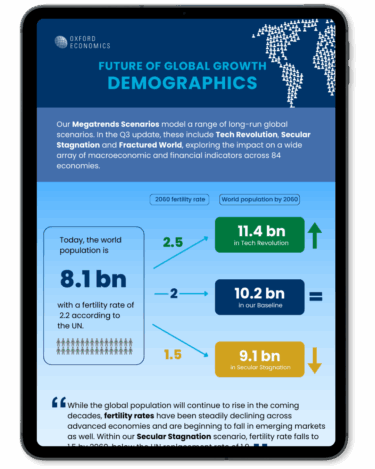Recent Release | 17 Oct 2023
Security’s Lament: The state of cyber security in the UK 2023-24

Thought Leadership Team
Oxford Economics

To take the pulse of cyber security, Oxford Economics and iomart surveyed 500 executives responsible for their organisation’s cyber strategy. The sample includes executives from a range of industries—most with more than 1,000 employees—all based in the UK.
The survey revealed these key takeaways:
Budgetary constraints hamstring cyber strategies in the face of increased incidents. A majority have an inadequate budget to fully protect their organisations at a time when many cite the increased cost of remediation as a major challenge. Rising insurance premiums can add to already strained budgets.
There is a promising future for cloud and automation within cyber strategies. Businesses are increasingly investing in such technologies to bolster cyber security. With many concerned by shortages in their internal cyber skills and awareness, these technologies are seen as particularly pertinent given their importance to email screening and automated resolutions.
While deploying the appropriate technology is crucial, effectively leveraging it requires the right people. The security skills gap yawns large and remains the biggest challenge for most cyber strategies. With internal skills and resources lacking, organisations face a major hurdle. To combat these obstacles and get the most from their tech investments, executives plan to invest in employee training while also hiring in-house specialists and third-party consultants.
The experts behind the research
Our Thought Leadership team produces original, evidence-based research made accessible to decision-makers and opinion leaders. Principals for this project included:

Teri Robinson
Managing Editor, Thought Leadership

Kayla Luparello
Research Manager, Thought Leadership

Maximilian Douglas Carl Vickers
Research Associate, Thought Leadership
Tags:
Recent technology-related reports

Future of Global Growth: Demographics
Our Megatrends Scenarios model a range of long-run global scenarios. In the Q3 update, these include Tech Revolution, Secular Stagnation and Fractured World, exploring the impact on a wide array of macroeconomic and financial indicators across 84 economies.
Find Out More
Roadblocks to China’s chip self-sufficiency dream
China is unlikely to achieve full chip self-sufficiency any time soon because of high technological hurdles in producing advanced manufacturing equipment and materials. The self-sufficiency target now stretches well beyond actual fabrication to include the entire chip supply chain as China struggles to acquire necessary input and machinery into the production process.
Find Out More
Why invest in AI ethics and governance?
In collaboration with the Notre Dame-IBM Technology Ethics Lab, Oxford Economics conducted 15 interviews with senior executives in 2024 to better understand how organizations are evaluating the ROI of AI ethics investments.
Find Out More
Global P&C Insurance Outlook to 2050
Capgemini leveraged custom macro and insurance market forecasts from Oxford Economics for their latest P&C insurance flagship report.
Find Out More